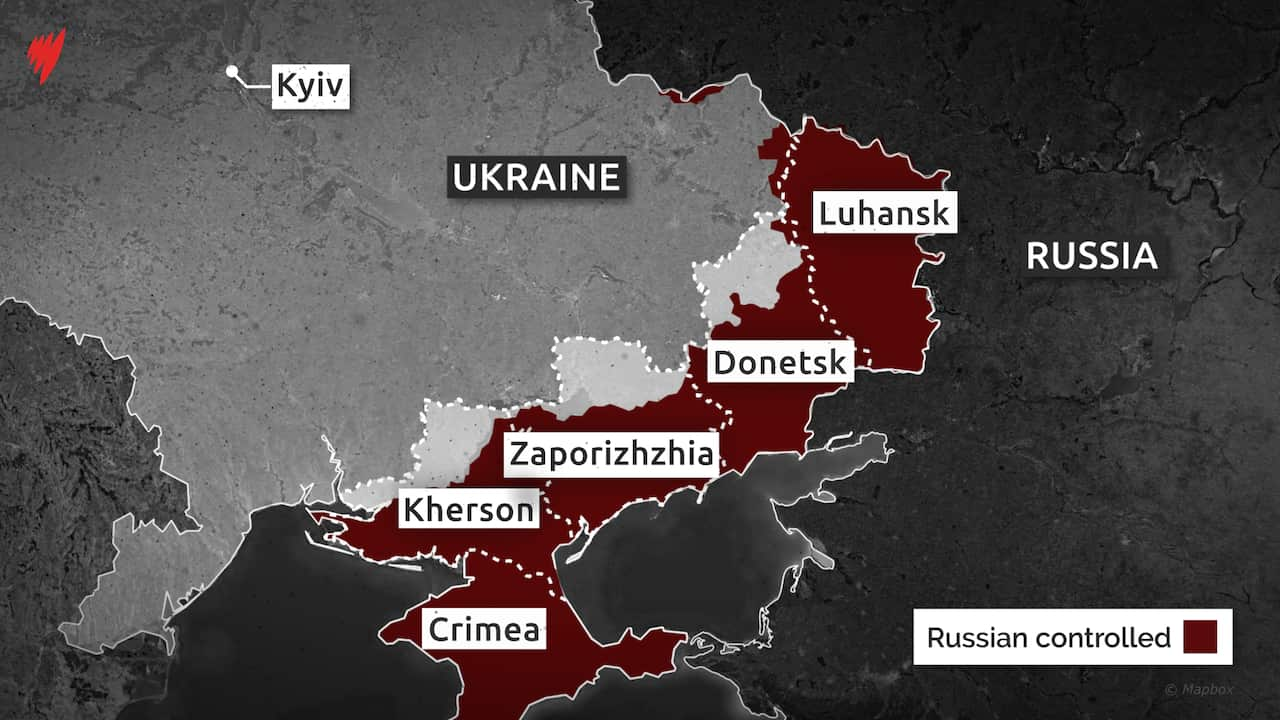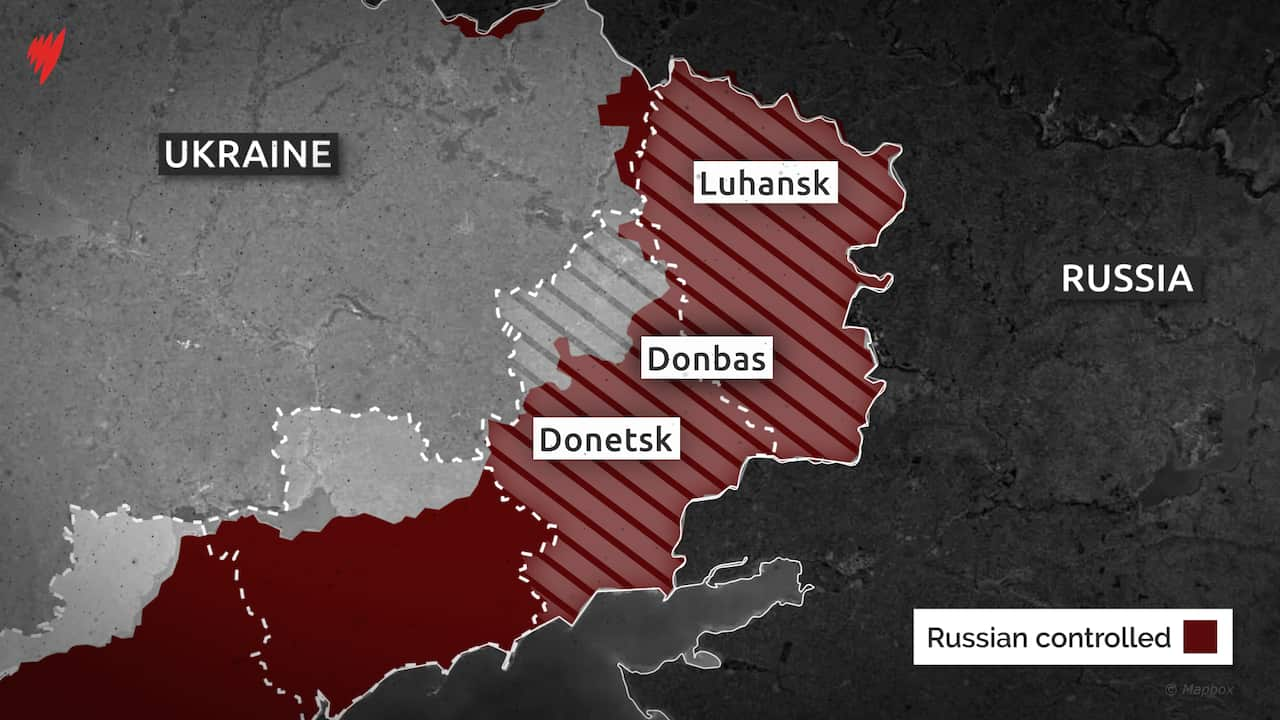Face-to-face peace talks between the presidents of Ukraine and Russia would be "incredibly significant", and they're the goal of US President Donald Trump as he pushes to end the war in Ukraine.
After meeting with Ukrainian President Volodymyr Zelenskyy at the White House on Monday, Trump suggested a trilateral meeting is in the works.
"I called President Putin, and began the arrangements for a meeting, between President Putin and President Zelenskyy," he wrote in a social media post.
He told reporters that meeting would be followed by another where he would join.
"We'll see what happens there," he said of a meeting between Putin and Zelenskyy. "If that works out, if it works out, then I'll go to the trilat and close it up."
But experts have told SBS News that a ceasefire arrangement would be complicated, and part of the reason is the protracted disputes over Ukrainian territories.
Will a trilateral meeting even happen?
German Chancellor Friedrich Merz, who attended talks between Zelenskyy and Trump, reportedly said a meeting between the pair and Putin could take place in as little as two weeks.
"We do not know whether the Russian president will have the courage to attend such a summit. That is why persuasion is needed," Reuters reported him saying.
Dr Jessica Genauer, a senior lecturer in international relations at Flinders University, said there was a "slim chance" Putin would agree to meet Zelenskyy face-to-face.
"It would be incredibly significant if President Putin would meet with President Zelenskyy because it would mean acknowledging that President Zelenskyy is the legitimate leader of a legitimate state," she told SBS News.
"Trump has talked about it and Trump is clearly pursuing the idea, but I think it's very unlikely that it will actually eventuate."
Trump himself has said that while he "hopes President Putin's going to be good", it was going to be a "rough situation" if he didn't.
Zelenskyy "has to show some flexibility also", Trump said.
Russia has not made any explicit commitment to a meeting between Putin and Zelenskyy, but multiple European leaders have suggested Geneva in Switzerland.
Political news site Politico reported on Tuesday that the White House was considering the Hungarian capital of Budapest.
Zelenskyy has expressed interest in meeting with Putin, but the Russian president may be more likely to prefer to speak via Trump.
"I think it's much more likely we'll see Putin agreeing to additional meetings with Trump — which are very much to his benefit — it means that he can show the Russian people that he is a peer to the United States, which is how he views himself and how he wants to appear domestically within the Russian context," Genauer said.
"That's not true in reality, but that is what President Putin would like to broadcast to his people."
Since Russia's full-scale invasion of Ukraine in 2022, it has occupied large swathes of land and displaced millions of people.
Russian-controlled territory and its future ownership will be a focus at any future peace meetings, as Putin has reportedly refused to withdraw Russian troops from those regions.
Significance of this territory
Russia currently controls large parts of four Ukrainian regions or 'oblasts' as they are known in Russia and some post-Soviet states.
These oblasts share their names with their respective administrative capitals — Kherson, Zaporizhzhia, Donetsk and Luhansk — which are along Ukraine's eastern border.
Russia annexed Crimea in 2014.

These regions have reportedly been the hardest hit in the last three years, and Genauer said Putin has ambitions to gain even more Ukrainian territory.
"He thinks that he can still gain control over more Ukrainian territory on the ground. He's determined to keep the territory that Russia has already captured. And what President Putin would like is for Trump to pressure Ukraine to formally cede territory to Russia," she said.
The Russian-controlled area represents around 20 per cent of Ukrainian sovereign territory, according to Genauer.
Pro-Russian sympathy
An area of particular interest to Putin is the Donbas region, which overlaps with the Donetsk and Luhansk regions.
The Russian president has reportedly said he would not withdraw soldiers from that region in particular during talks with the White House.
But Zelenskyy has signalled that ceding Donbas is not an option for Ukraine, and could embolden future Russian assaults.
"We will not leave Donbas. We cannot do this," he said.
"Our territories are illegally occupied. Donbas for the Russians is a springboard for a future new offensive."
Professor emeritus Graeme Gill, a political scientist from the University of Sydney, said the region has an interesting history.
He told SBS News the "loyalty" of the area has been "very fluid" due in part to the Russian heritage of some of its citizens.
"Putin's argument is that it's always been primarily a Russian area, which was arbitrarily carved out of Russia and given to Ukraine when the Soviet Union was established. So it's also part of getting back some of what he feels was lost as a result of the collapse of the Soviet Union," he said.

He explained that while Donbas has some Russian roots, people in the area ultimately voted in a referendum to become independent from the Soviet Union following its 1991 collapse.
In a 2022 referendum in the occupied territories, Russian-installed officials in Ukraine reported huge majorities of votes in favour of joining Russia.
However, Russian-installed officials had taken ballot boxes from house to house in what Ukraine and the West said was an illegitimate, coercive exercise to create a legal pretext for Russia to annex the four regions.
"This farce in the occupied territories cannot even be called an imitation of a referendum," Zelenskyy said at the time.
Gill said Donbas also has important geographical and economic factors that could be desirable to Putin, as a major exporter of coal and heavy industrial production.
"They make railway sleepers and industrial equipment, which would be attractive to Putin," he said.
State of the war
It's been three years since Russia launched its full-scale invasion of Ukraine, and almost a decade since it annexed Crimea in 2014.
Gill said Putin appears determined to continue the war.
"Putin's not going to give up. And although his economy has run into some problems or he's running into some problems now, there's no evidence that those are sufficient to prevent him from continuing the war," he said.
He added that Ukraine is losing ground "virtually every day to Russia".
"The Ukrainians have been able to hold on through grit, determination, and the use of weapons from the West. But the problem for them is that they're very greatly outnumbered.
"They cannot replace the soldiers that they're losing as a result of the conflict."
Genauer said Zelenskyy "needs a ceasefire".
"Ukraine is still bearing a lot of costs from the war. It's still being bombarded by Russia in terms of drones and other artillery.
"So that's going to be the main sticking point between what Ukraine and the Europeans want, which will be a ceasefire first, followed by negotiations for some kind of territorial agreement."
For the latest from SBS News, download our app and subscribe to our newsletter.

